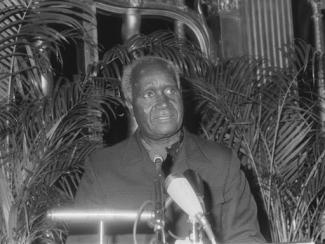
When you look good, you feel good. The Kaunda is a bold, often bright safari-style suit worn by many African government officials. Zambia’s first post-colonial president, Kenneth Kaunda, popularized the suit, so for many, it became a physical symbol of independence from colonial regimes.
In November of 2023, the Kenyan government banned the wearing of the Kaunda suit and other traditional cultural attire in parliament, deeming it inappropriate. Instead, only Western suits and ties for men and below-the-knee dresses or skirts for women are allowed.
As president of South Africa, Nelson Mandela proudly wore bold prints with his signature Madiba shirts. Goodluck Jonathan, former Nigerian president, was known for his fedora, a staple among tribal chiefs from his region.
They both understood the importance of showing up as themselves and the power of being unapologetically Black.
No matter how we dress, anti-Blackness still exists. Abandoning our cultural customs in favor of Western ones does not insulate us from the systems we’re fighting against. Respectability politics has never saved us.
Decolonization isn’t just about destroying the institutions that anti-Blackness created. It also requires us to release beliefs about who we are and what anti-Blackness says we should be.
We have to do the work to decolonize anti-Black ways of thinking. We don’t have to appease anyone to be taken seriously. We create our own standards.